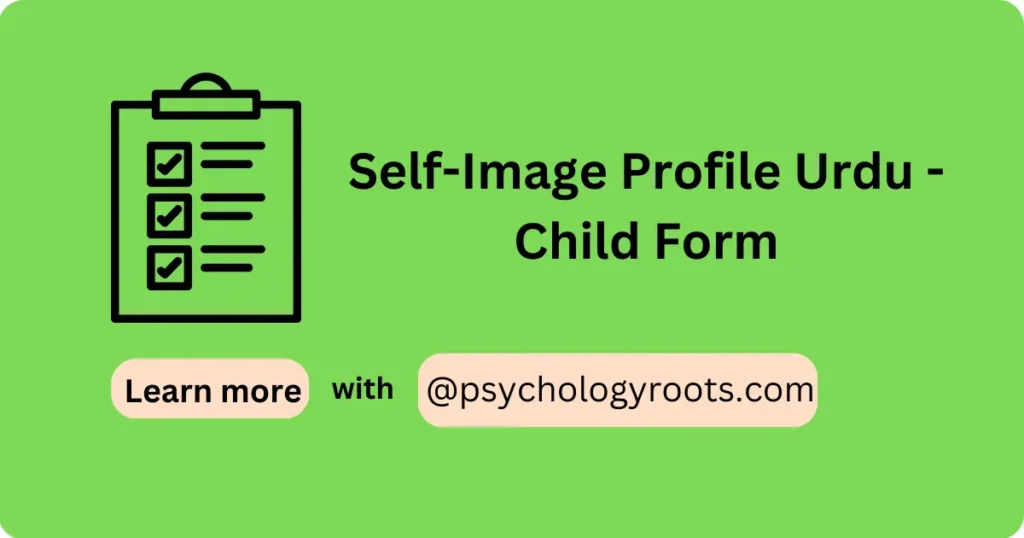Table of Contents
Self-Image Profile Urdu – Child Form
Here in this post, we are sharing the “Self-Image Profile Urdu – Child Form”. You can read psychometric and Author information. We have thousands of Scales and questionnaires in our collection (See Scales and Questionnaires). You can demand us any scale and questionnaires related to psychology through our community, and we will provide you with a short time. Keep visiting Psychology Roots.
About Self-Image Profile Urdu – Child Form
Scale Name
Self-Image Profile Urdu – Child Form
Author Details
Still Searching
Translation Availability
Not Sure

Background/Description
A child’s self-image is a fascinating and crucial aspect of their development. It’s the mental picture they have of themselves, encompassing their strengths, weaknesses, skills, abilities, and overall worth. Building a positive self-image is essential for their emotional well-being, social learning, and overall success in life.
Here are some key points to understand about self-image in children:
Development Timeline:
- Infancy (0-18 months): Babies first develop a sense of self through physical experiences and interactions with caregivers. Secure attachment plays a critical role in building trust and a positive self-concept.
- Early Childhood (18 months-5 years): As children begin to explore their independence and interact with others, they start to compare themselves to their peers and form early judgments about their abilities and appearance. Play, praise, and positive reinforcement are essential for nurturing a healthy self-esteem.
- Middle Childhood (5-12 years): This is a period of significant cognitive and social development, with children focusing on academics, friendships, and social acceptance. Peer pressure and academic performance can significantly impact their self-image. Positive role models and supportive environments are crucial.
- Adolescence (12-18 years): As teens navigate physical changes, identity formation, and peer relationships, their self-image becomes more complex and nuanced. Self-exploration, body image concerns, and social acceptance play major roles. Encouragement, open communication, and guidance are crucial for supporting healthy self-development.
Factors Influencing Self-Image:
- Family Relationships: Secure and loving relationships with parents and caregivers provide the foundation for a positive self-image. Parental warmth, acceptance, and encouragement are critical.
- Social Interactions: Positive experiences with peers and teachers can boost self-esteem and confidence. Bullying, social exclusion, or negative feedback can harm self-image.
- Academic Performance: Success in school, mastering new skills, and receiving positive feedback contribute to a sense of competence and self-worth.
- Physical Appearance: Body image concerns can significantly impact self-esteem, especially during adolescence. Focusing on healthy habits and promoting self-acceptance are crucial.
- Media and Cultural Influences: Media portrayals and unrealistic beauty standards can negatively impact self-image. Critical thinking skills and open conversations about media messages are important.
Supporting a Positive Self-Image:
- Focus on Effort and Learning: Praise effort and progress over outcomes, teaching children that mistakes are opportunities to learn and grow.
- Celebrate Strengths and Individuality: Encourage children to explore their interests and talents, fostering a sense of pride in their unique strengths.
- Set Realistic Goals and Provide Opportunities for Success: Help children set achievable goals and provide opportunities for them to experience success, boosting their confidence and sense of agency.
- Promote Positive Body Image: Focus on health and well-being over appearance, and normalize a variety of body shapes and sizes.
- Open Communication and Emotional Support: Create a safe space for children to express their feelings and concerns, offering supportive guidance and unconditional love.
Administration, Scoring and Interpretation
- Purpose of the assessment: Briefly explain the aim of measuring.
- Anonymity and confidentiality: Assure participants of anonymity and confidentiality of their responses.
- Honest responses: Encourage honest and accurate answers for meaningful results.
- No right or wrong answers: Emphasize that there are no “correct” answers, and participants should respond based on their own experiences and perspectives.
Reliability and Validity
Still searching
Available Versions
25-Items
Reference
Still Searching
Important Link
Scale File:
Disclaimer
Please note that Psychology Roots does not have the right to grant permission for the use of any psychological scales or assessments listed on its website. To use any scale or assessment, you must obtain permission directly from the author or translator of the tool. Psychology Roots provides information about various tools and their administration procedures, but it is your responsibility to obtain proper permissions before using any scale or assessment. If you need further information about an author’s contact details, please submit a query to the Psychology Roots team.
Help Us Improve This Article
Have you discovered an inaccuracy? We put out great effort to give accurate and scientifically trustworthy information to our readers. Please notify us if you discover any typographical or grammatical errors.
Make a comment. We acknowledge and appreciate your efforts.
Share With Us
If you have any scale or any material related to psychology kindly share it with us at psychologyroots@gmail.com. We help others on behalf of you.